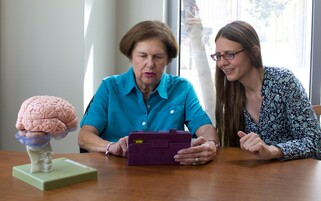“There is accumulating evidence that working memory training can be effective in older adults at risk for dementia, however, not everyone seems to benefit from such interventions, and to date, knowledge is extremely limited regarding the underlying mechanisms that promote brain health in aging, and what components of the intervention might be most helpful,” Jaeggi said.
Jaeggi and Seitz have three research goals:
“This proposal is transformative in that it seeks to understand how individual cognitive strengths and needs in older adults may have different requirements for training interventions,” Jaeggi said. “Addressing cognitive decline in older adults has driven a now multibillion-dollar commercial market. Our research findings are intended to shed light on the factors that mediate and moderate these types of cognitive interventions and address the extent to which some procedures may, and others may not, lead to improvements in real-world cognition.” The project title is “Understanding Individual Differences in Working Memory Training and Transfer in Older Adults at Risk of Alzheimer’s Disease and Related Dementias.” The three researchers are also collaborating on a nationwide NIH-funded citizen science project that aims to recruit 30,000 volunteers to figure out what cognitive interventions might work best for whom, a project that is open for participation to all. The training software for this research is being created by the team at the UC Riverside Brain Game Center for cross-platform game engines enabling the researchers to bring the lab to the participants. At the conclusion of the grant, the programs created will be made publicly available for research dissemination of personalized interventions that can support brain health in diverse populations. Comments are closed.
|
Resources for:
|
|


